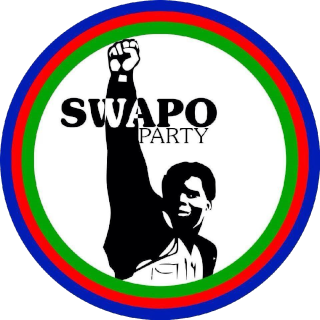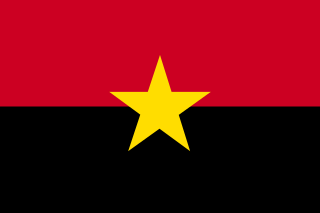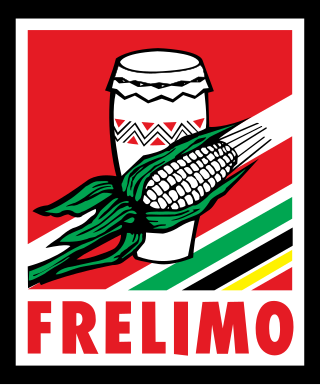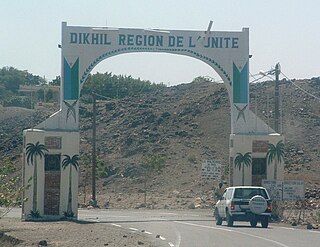Djibouti is a country in the Horn of Africa bordered by Somalia to the east, Eritrea to west and the Red Sea to the north, Ethiopia to the west and south, and the Gulf of Aden to the east.

Politics of Djibouti takes place in a framework of a presidential representative democratic republic, whereby the executive power is exercised by the President and the Government. Legislative power is vested in both the Government and the National Assembly. The party system and legislature are dominated by the socialist People's Rally for Progress. In April 2010, a new constitutional amendment was approved. The President serves as both the head of state and head of government, and is directly elected for single six-year term. Government is headed by the President, who appoints the Prime Minister and the Council of Ministers on the proposal of the latter. There is also a 65-member chamber of deputies, where representatives are popularly elected for terms of five years. Administratively, the country is divided into five regions and one city, with eleven additional sub-prefecture subdivisions. Djibouti is also part of various international organisations, including the United Nations and Arab League.

The politics of Eritrea and the government of Eritrea take place in the framework of a single-party presidential republican totalitarian dictatorship. The President officially serves as both head of state and head of government. The People's Front for Democracy and Justice is the only political party legally permitted to exist in Eritrea. The popularly elected National Assembly of 150 seats, formed in 1993 shortly after independence from Ethiopia, elected the current president, Isaias Afwerki. There have been no general elections since its official independence in 1993. A new constitution was drafted in 1993 and ratified in 1997, but has not been implemented. Since the National Assembly last met in January 2002, president Afwerki has exercised the powers of both the executive and legislative branches of government.

Obock is a small port town in Djibouti. It is located on the northern shore of the Gulf of Tadjoura, where it opens out into the Gulf of Aden. The town is home to an airstrip and has ferries to Djibouti City. The French form Obock derives from Arabic "Oboh", which is a deformation of Oboki, a name given to a local wadi.

The South West Africa People's Organisation, officially known as the SWAPO Party of Namibia, is a political party and former independence movement in Namibia. Founded in 1960, it has been the governing party in Namibia since the country achieved independence in 1990. The party continues to be dominated in number and influence by the Ovambo ethnic group.

The People's Movement for the Liberation of Angola, from 1977–1990 called the People's Movement for the Liberation of Angola – Labour Party, is an Angolan social democratic political party. The MPLA fought against the Portuguese Army in the Angolan War of Independence from 1961 to 1974, and defeated the National Union for the Total Independence of Angola (UNITA) and the National Liberation Front of Angola (FNLA) in the Angolan Civil War. The party has ruled Angola since the country's independence from Portugal in 1975, being the de facto government throughout the civil war and continuing to rule afterwards.

Ismaïl Omar Guellé is a Djiboutian politician who has served as the President of Djibouti since 1999, making him one of the longest-serving rulers in Africa. He is often referred to by his initials, IOG.

Isaias Afwerki is an Eritrean politician and partisan who has been the first and only president of Eritrea since 1993. In addition to being president, Isaias has been the chairman of Eritrea's sole legal political party, the People's Front for Democracy and Justice (PFDJ).

FRELIMO is a democratic socialist political party in Mozambique. It has governed the country since its independence from Portugal in 1975.

Hassan Gouled Aptidon was the first President of Djibouti from 1977 to 1999.

Ahmed Dini Ahmed was a Djiboutian politician who served as the second Prime Minister of Djibouti. He was trained as a health technician and entered the political realm at age 26.

National-level elections in Djibouti are held for the President and the unicameral National Assembly.

Dikhil is a town in the western Dikhil Region of Djibouti. Lying east of Lake Abbe, It is situated about 122 km (76 mi) southwest of Djibouti City and 12 km (7.5 mi) north of the border with Ethiopia. It serves as the administrative centre of the Dikhil Region, and is home to the Afar and Somali ethnic groups. The town develops gardens and fruit trees.

Djibouti, officially the Republic of Djibouti, is a country in the Horn of Africa, bordered by Somalia to the south, Ethiopia to the southwest, Eritrea in the north, and the Red Sea and the Gulf of Aden to the east. The country has an area of 23,200 km2 (8,958 sq mi).

The Front for the Liberation of the Somali Coast was a nationalist organization, and later a guerrilla group that fought for the independence of Djibouti from France. The Front de Libération de la Côte des Somalis (FLCS) was recognized as a national liberation movement by the Organization of African Unity (OAU), which participated in its financing. FLCS was able to obtain support from Arab countries such as Algeria.
Republican Union was a political party in French Somaliland.

Presidential elections were held in Niger on 27 February 1993, with a second round on 27 March after no candidate passed the 50% barrier in the first round. They were the first multi-candidate presidential elections held in the country since independence in 1960, following constitutional changes approved in a referendum the previous year. Although Mamadou Tandja of the ruling National Movement for the Society of Development won the most votes in the first round, he lost in the second round to Mahamane Ousmane of the Democratic and Social Convention party. Voter turnout was only 32.5% in the first round and 35.2% in the second.

An independence referendum was held in French Somaliland on 19 March 1967. It was ordered by then President of France, General Charles de Gaulle, in response to rioting and demonstrations upon an official visit he made to the territory the year before. Voters rejected independence from France by a 22-point margin.
The African Regroupment Party was a political party in the French African colonies.

The issue of human rights in Djibouti, a small country situated within the Horn of Africa, is a matter of concern for several human rights organizations.















